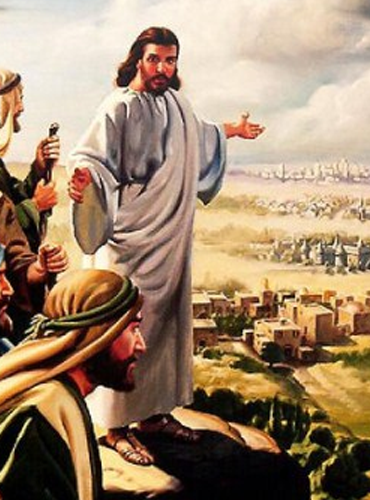Memorial of Saint Jerome
Today’s readings ask us to reflect on the way we serve God; the first readings from this week (when not interrupted by feasts) have all been centered on Job and his sufferings. At some point, Job gets to thinking that he really hasn’t ever done anything wrong. Today, God sets the record straight (and rather forcefully, at that): “Have you ever in your lifetime commanded the morning and shown the dawn its place? . . . Have you entered into the sources of the sea, or walked about in the depths of the abyss? Have the gates of death been shown to you, or have you seen the gates of darkness? Have you comprehended the breadth of the earth?” With this, Job is effectively reminded of his place in the world. This humiliation, however, leads him back to God.
Today’s Gospel reminds us that the stakes are very high. As Luke recalls for us, Jesus harshly rebukes the three cities that had been a special focus of His ministry: Chorazin, Bethsaida, and Capernaum. The mention of Chorazin is particularly interesting, because Jesus speaks of the “mighty deeds done in their midst,” and yet this is the only mention of that city in the Bible. There’s absolutely no reference to it in the Old or New Testaments besides this phrase from Jesus, and even the historian Josephus doesn’t speak of it. We have absolutely no idea what Jesus said or did there, but we can be sure that His listeners did. Rather than see those deeds, those miracles, as the impetus for conversion and drawing closer to the living God, they became a source of condemnation, because those who saw them didn’t appreciate their importance or take the time to understand and be grateful.
As Christians, but especially as religious, we are to bear witness with our very lives to the “mighty deeds” that God has done for us, all the means that He has used to sanctify us, first and foremost our vocations, but also all of those hidden graces known to us alone. Sometimes, as in the case of sufferings, it’s harder to see God’s plan, but it doesn’t become for that reason any less precious or loving of a gift.
Let us remember that on Calvary there were three crosses, but only one brought salvation. It wasn’t simply suffering on the cross next to Jesus that saved, but rather being united to Him, and using that suffering as a means of expiation and a gateway to union with Christ. We can ask ourselves about the way we endure sufferings: do we accept them as part of the Cross that God sends to make us saints and so that we can intercede for sinners? Or do we complain? Also, do we thank God for everything that He sends us, no matter how bad it seems? Or do we act like spoiled children who, in spite of the greatness of the gift, reject it because they don’t like the way it’s wrapped?
Today, then, let us pray, through the intercession of Mary, Model of Holiness, and Saint Jerome, for the grace of taking up our cross, accepting what God wants to send our way with docility and love for the praise and service of His Glory.






